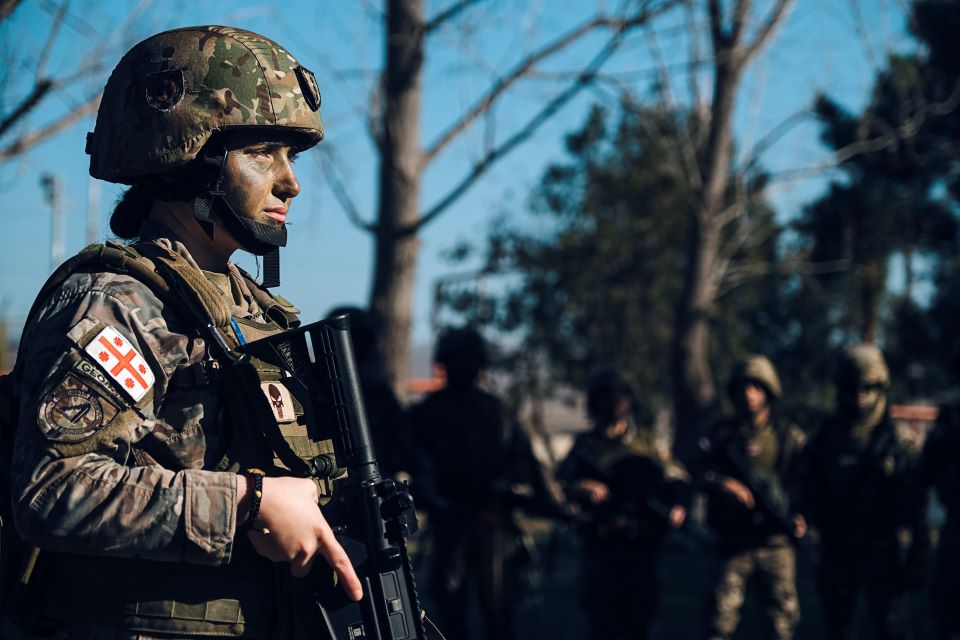Georgian women in defence create examples of change
UN Women has been actively working on gender mainstreaming in the Ministry of Defence of Georgia for more than a decade already. Among other initiatives, this collaboration involves the appreciation of contributions of women in the Georgian Defence Forces. This was the very purpose of the publication “Women in Service to Georgia”, prepared by UN Women in cooperation with the Ministry of Defence. Lieutenant-Colonel Tamar Mghebrishvili and First Lieutenant, Tamuna Jishkariani are two of the heroes featured in this publication.
Date:
“It is a great honour for me to be a role model for future generations to come and to show them by my own example that women are strong military unit commanders and leaders” – Lieutenant-Colonel Tamar Mghebrishvili.
Tamar Mghebrishvili was 7 years old when her mother took her to a demonstration on Rustaveli Avenue. She wanted to go on stage, but suddenly her mother ran into a friend who advised her to get the child away from the area. That night, Soviet soldiers brutally dispersed the peaceful demonstration in Tbilisi. Tamar and her mother managed to escape just in time. She recalls the impact on her life: “The emotions of that tragic day of 9 April have been imprinted in my memory forever. I think my choice—to serve my country in a uniform—was shaped by those events.”
At first, Tamar wanted to become a lawyer, but her father’s words—“women have no business practicing law”—made her change her mind. She entered the Faculty of Western European Languages at her university, but she soon realized that it would not lead to the career of her dreams. So, she managed to make her actual dream come true: after graduating from university, she enrolled in the David Aghmashenebeli National Defence Academy of Georgia, specifically the Junior Officers Training School programme.
But Tamar recalls that during her studies at the Academy, she would often hear the view that there is no place for women in the infantry. “Even later, when the time came for deployment to positions,” she explains, “the brigade commander wanted me to be appointed to a position at headquarters. But he changed his mind after my firm response: ‘I belong in the infantry.’ That’s how I became a platoon commander and a woman officer acting as a fully fledged member of a large military family, directly positioned in the field.”
Her position as platoon commander was followed by her roles as a commander, Chief of Staff of the Battalion and Brigade Staff Planning Officer, career training courses in the United States of America and two peacekeeping missions to Afghanistan. Tamar served in the infantry brigade for nine years and later held the position of Training Planning Officer at the NATO-Georgia Joint Training and Evaluation Center (JTEC). Today, the 39-year-old Lieutenant-Colonel is the Head of the Substantial NATO-Georgia Package (SNGP) Support Unit of the Ministry of Defence of Georgia. Her activities involve daily cooperation with Georgian and NATO leaders to ensure that each step is completed consistently and on time, in order to achieve the final result.
Lieutenant-Colonel Mghebrishvili continues to perform her duties with full determination. “Every day, when I put on my uniform and leave the house, I feel proud,” she beams. “It is a great honour for me to be a role model for future generations to come and to show them by my own example that women are strong military unit commanders and leaders. The most important thing that counts is professionalism, not gender.”

“Being in the military is not an easy task at all. Our way of life is completely different from that of an ordinary civilian” – First Lieutenant, Platoon commander Tamuna Jishkariani
Tamuna Jishkariani, 28, is the Deputy Commander of the 41st Infantry Platoon B of the 4th Mechanized Infantry Brigade. Tamuna has never thought about pursuing a different profession: the only profession she could imagine for herself was one in the military. “I have always liked the uniform,” she explains, “but I especially appreciated the people in uniform who were ready to defend their homeland at the cost of their own lives. The war in August 2008 intensified my desire even more: I finally decided to be in the military and wear a military uniform with dignity.“
In 2015, Tamuna enrolled in the National Defence Academy and became a cadet. Alongside her military training, she also received civil education in the defence and security sector. After graduating from the Academy, she completed an infantry course and was promoted to platoon commander—already as a first lieutenant. Family members knew about Tamuna’s professional aspirations from an early age and helped her as much as they could. “Although they find it difficult when I am on duty or training and am sometimes even away from home for a month, they still support me,” she says. “I know that many things that are completely understandable to the military are confusing to civilians. But it is quite natural: being in the military is not an easy task at all. Our way of life is completely different from that of an ordinary civilian.”
The common belief that women find it difficult to serve in the army because of their physiology is simply a stereotype to Tamuna. She believes that in the case of both sexes, the primary factors that determine one’s fitness to serve are training, work, psychological readiness, and the constant pursuit of personal development. “I cannot say that I haven’t encountered difficulties because of my sex, but who can say that?” asks the 28-year-old platoon commander. “But I have never felt any kind of distrust caused by the fact that I am a woman and that I could not do this or that task because of it.”
Like all members of the military, First Lieutenant Jishkariani thinks about career advancement: new courses and different experiences are ahead for her.